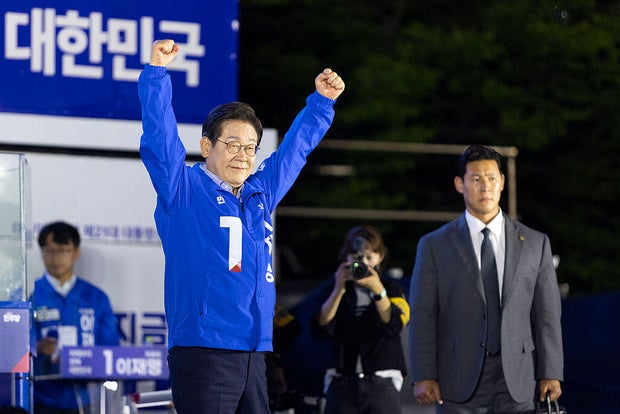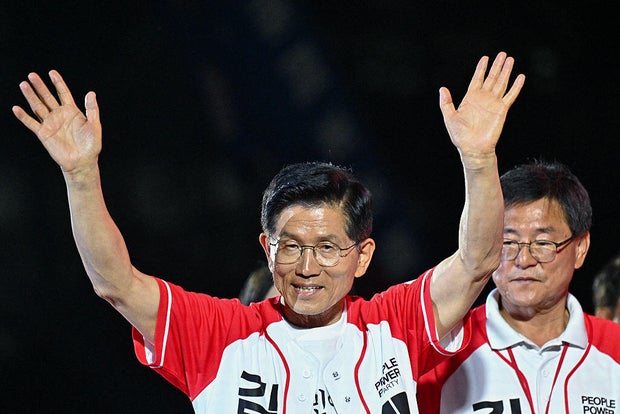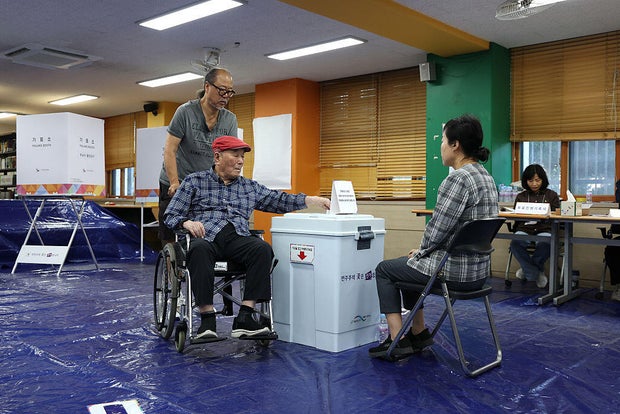
South Koreans are voting for a new president in a snap election triggered by the ouster of Yoon Suk Yeol, a conservative who is facing rebellion charges over his short-lived imposition of martial law late last year.
Voting began at 6 a.m. local time Tuesday at more than 14,000 polling stations nationwide, the election commission said. Voting ends at 8 p.m. local time, and observers say the winner could emerge as early as midnight.
More than 15 million people had already voted during a two-day early voting period last week, accounting for nearly 35% of the country’s 44.4 million eligible voters.
/ Getty Images
Pre-election surveys suggest Yoon’s liberal archrival, Lee Jae-myung, appears headed for an easy win, riding a wave of public frustration over conservatives in the wake of Yoon’s martial law debacle. In a Facebook post, Lee called for voters to “deliver a stern and resolute judgement” against conservatives following the months of political turmoil.
Meanwhile, the main conservative candidate, Kim Moon-soo, has struggled to win over moderate, swing voters.
This election serves as another defining moment in the country’s resilient democracy, but observers worry a domestic divide worsened by Yoon is far from over and could pose a big political burden on the new president.
The winning candidate will immediately be sworn in as president for a single, full term of five years without the typical two-month transition period. The new president will face major challenges, including a slowing economy, President Trump’s America-first policies and North Korea’s evolving nuclear threats.
Chris Jung/NurPhoto via Getty Images
Lee has preached patience over Mr. Trump’s tariff policy, arguing it would be a mistake to rush negotiations in pursuit of an early agreement with Washington. Kim has said he would meet Mr. Trump as soon as possible.
Final campaign pitches
In his final campaign speeches Monday, Lee promised to revitalize the economy, reduce inequality and ease national divisions. He urged the people to vote for him, arguing that a win by Kim would allow Yoon’s “rebellion forces” to return.
“If they somehow win, that would mean the return of the rebellion forces, the destruction of democracy, the deprival of people’s human rights, the normalization of martial law and our country’s downfall into a backward, third-world nation,” Lee told the crowd gathered at a Seoul park.
PEDRO PARDO/AFP via Getty Images
Kim, a former labor minister under Yoon, warned that a Lee win would allow him to wield excessive power, launch political retaliation against opponents and legislate laws to protect him from various legal troubles, as his party already controls parliament.
Lee “is now trying to seize all power in South Korea and establish a Hitler-like dictatorship,” Kim told a rally in the southeastern city of Busan.
North Korea relations unclear
Relations with North Korea remain badly strained since 2019, with the North focused on expanding its nuclear arsenal while refusing dialogue with South Korea and the U.S.
Since his second term began in January, Mr. Trump has repeatedly expressed his intent to resume diplomacy with North Korean leader Kim Jong Un, but Kim has so far ignored the offer while making Russia his priority in foreign policy.
/ Getty Images
Lee, who wants warmer ties with North Korea, recently acknowledged it would be “very difficult” to realize a summit with Kim Jong Un anytime soon. Lee said he would support Mr. Trump’s push to restart talks with Kim Jong Un, which he believed would eventually allow South Korea to be involved in some projects in North Korea.
Foreign policy strategists for Lee understand there isn’t much South Korea can do to bring about a denuclearization of North Korea, said Paik Wooyeal, a professor at Seoul’s Yonsei University.
He said Lee also doesn’t share the Korean nationalistic zeal held by ex-liberal President Moon Jae-in, who met Kim Jong Un three times during his 2017-2022 term.








